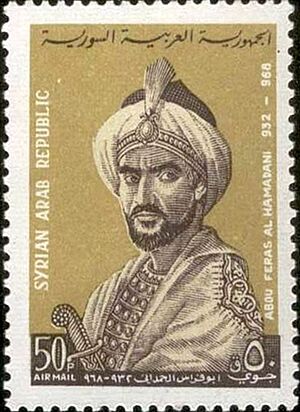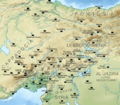Abu Firas al-Hamdani facts for kids
Quick facts for kids
Abu Firas al-Hamdani
|
|
|---|---|

1963 Syrian postage stamp with a modern representation of Abu Firas
|
|
| Born |
Al-Harith ibn Abi'l-Ala Sai'd
932/933 probably Baghdad
|
| Died | 4 April 968 (age 35-36) Sadad (near Homs)
|
| Occupation | Governor, military leader and poet |
| Years active | 948–968 |
|
Notable work
|
al-Rūmiyyāt |
Al-Harith ibn Abi’l-ʿAlaʾ Saʿid ibn Hamdan al-Taghlibi (932–968), known by his pen name Abu Firas al-Hamdani (Arabic: أبو فراس الحمداني), was an Arab prince and a famous poet. He was a cousin of Sayf al-Dawla and part of the Hamdanid dynasty. This family ruled parts of northern Syria and Upper Mesopotamia in the 900s.
Abu Firas worked for Sayf al-Dawla as a governor and a poet at his court. He also fought in his cousin's wars against the Byzantine Empire. In 959 or 962, the Byzantines captured him. He spent several years in their capital, Constantinople. While there, he wrote his most famous poems, called al-Rūmiyyāt. He was set free in 966. In 968, he was killed after an uprising against his nephew, Sa'd al-Dawla. Abu Firas is seen as one of the greatest classical Arabic poetry writers.
Contents
Life of Abu Firas
Abu Firas was born in 932 or 933, likely in Baghdad, Iraq. His father, Abi'l-Ala Sa'id, was an important person in the court of the Abbasid caliph al-Muqtadir. Abu Firas's mother was a Byzantine Greek woman. Some of his Hamdanid relatives later made fun of his mother's background, and he wrote about this in his poems.
Abi'l-Ala Sa'id was killed in 935 during a fight over the city of Mosul. Abu Firas's mother then went to live with Sayf al-Dawla, his father's nephew. When Sayf al-Dawla took over Aleppo and northern Syria around 944, Abu Firas was welcomed at his cousin's court. Sayf al-Dawla raised him and also married Abu Firas's sister, Sakhinah.
Sayf al-Dawla was known for being a great warrior and for supporting scholars and poets. This meant Abu Firas grew up in a place full of culture and learning. Many smart people of the Muslim world were at the court in Aleppo. These included the philosopher al-Farabi and the famous poet al-Mutanabbi. A grammarian named Ibn Khalawayh was Abu Firas's teacher.
Early Career and Battles
Abu Firas quickly showed he was good at both fighting and writing. In 947 or 948, when he was only 16, Sayf al-Dawla made him governor of Manbij. This city was near the border with the Byzantine Empire. Later, he also became governor of Harran.
Even though he was young, Abu Firas proved himself in battles. He fought against the Nizari tribes in the Syrian Desert. He also joined his cousin's frequent attacks into Byzantine lands. For example, in 952, he defeated the Byzantines. They were led by Bardas Phokas the Younger or his son Constantine Phokas. This happened when the Byzantines tried to stop Sayf al-Dawla from rebuilding the towns of Ra'ban and Mar'ash.
Captured by the Byzantines
Arabic historical writings give different dates for when Abu Firas was captured by the Byzantines. Some say he was first captured in 959 but escaped by jumping into the Euphrates River. However, many modern experts don't believe this story.
Most sources say he was captured in 962, possibly in November. A Byzantine general named Theodore Parsakoutenos led a raid with about 1,000 to 1,300 men near Manbij. Abu Firas went out with only 70 men to stop them from stealing. He was captured during this fight.
Parsakoutenos wanted to trade Abu Firas for his own brother and father. These family members had been captured by Sayf al-Dawla in 954. Abu Firas sent many letters to his cousin, asking to be set free. But he spent several years as a prisoner in Constantinople, the Byzantine capital. Sayf al-Dawla felt it was not right to free Abu Firas while thousands of other prisoners were still held captive.
Abu Firas was finally released in 966 as part of a large prisoner exchange at Samosata. During his time as a prisoner, Abu Firas wrote some of his best poems. This collection is known as al-Rūmiyyāt. The word Rūm was the Arab name for the Byzantines. While he was away, Abu Firas's mother died. Her death was a source of sadness in his poetry.
Later Life and Death
After his release, Abu Firas got his old job back and was made governor of Homs. But things were changing quickly. Less than a year after he was freed, Sayf al-Dawla died. The Hamdanid rule in Aleppo began to weaken.
Abu Firas soon had disagreements with Sayf al-Dawla's 15-year-old son, Abu'l-Ma'ali. Abu'l-Ma'ali was also Abu Firas's nephew, the son of his sister Sakhinah. Abu Firas thought he had more support from the Arab tribes than he did. He started an uprising against his nephew. However, he was defeated and killed on April 4, 968, by Abu'l-Ma'ali's general, Karghawayh. When Sakhinah heard about her brother's death, she was so sad that she reportedly pulled out one of her own eyes.
Abu Firas's Poetry
Abu Firas is a very important figure among the great classical Arabic poetry writers. A scholar from his time, Sahib ibn Abbad, said that "Poetry began with a king (meaning Imru al-Qays) and ended with a king (meaning Abu Firas)." This shows how highly people thought of Abu Firas even in the 900s.
After his death, his works were put together by Ibn Khalawayh, his old tutor. Ibn Khalawayh also added notes, many of which were written by Abu Firas himself. However, later on, different versions of his poems were found. This means Ibn Khalawayh's collection was not the only one.
Types of Poems
Abu Firas's early poems include those in the classical qaṣīda style. These poems praised the Hamdanid family and their brave actions. The 225-line Ḥamdāniyyah is one of the most famous. He also wrote shorter poems in the ʿIrāqī style. These were about common courtly topics like love, wine, hunting, and friendship. He also wrote some poems that supported Shia beliefs and criticized the Abbasids.
His early works and the al-Rūmiyyāt show the influence of al-Mutanabbi, another great poet. But Abu Firas was also a rival to al-Mutanabbi. His teacher, Ibn Khalawayh, did not like al-Mutanabbi and encouraged Abu Firas.
According to H. A. R. Gibb, Abu Firas's qaṣīda poems are "sincere, direct, and naturally strong." This is different from the more complex style of al-Mutanabbi. His ʿIrāqī poems are seen as "elegant but not very original." However, it is the al-Rūmiyyāt that truly made Abu Firas famous. These poems combine "sadness, dignity, and pride."
Besides his writing, Abu Firas's own personality helped his fame grow. He came from a noble family and was said to be handsome, brave, and generous. He also had a strong sense of self-importance and big goals. He was seen as living up to the Arab ideal of a chivalrous knight, which he also wrote about in his poetry.
See Also
- Arabic literature
- Hamdanid dynasty
Images for kids
 | Ernest Everett Just |
 | Mary Jackson |
 | Emmett Chappelle |
 | Marie Maynard Daly |


